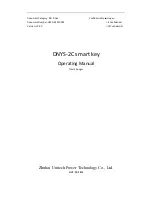
OM0291
Page 32 of 56
Rev 3 November2020
7.3 HEPA Filter/Motor Replacement
The HEPA Filters do not need replacement under normal usage and barring an accident (a puncture), until the efflux
velocity cannot be maintained or the access inflow velocity cannot be maintained at 100 LFPM (.51 m/s) (min.).
This may permit the average downflow velocity to be as low as 55 LFPM (.28 m/s) as long as no point falls below 20% of the
average downflow velocity.
The HEPA Filters should not be replaced until the entire cabinet has been decontaminated or known to be biologically
"clean".
7.3.1 Procedure
Disconnect electrical power from the cabinet before attempting any
maintenance action.
Step 1: Remove screws at each upper side of the control center and allow the control center to rotate down,
resting on the safety straps. Second, remove the front decorative panel which is held into position by
(3) knurled nuts on the top edge and snap fit bullet catches on the bottom.
Step 2: Place sliding window into lowest position * and remove front filter panel, which is held into position
by Phillip pan head screws. Once the screws are removed, the panel is held into position by smooth
weld studs located on the top corner of the front filter panel. Use the window stop brackets as
handles to remove the panel.
Note: Screws are used in lieu of acorn nuts, and lock washers.
The screws have O-rings and should be replaced if damaged or badly deformed.
The interior of the cabinet is now fully exposed for replacement of the filters and motor/blower.
* The lowest window position will require the armrest to be removed.
If the cabinet has the power window option, access the Power Window Test menu to adjust the power window
into its lowest position with the armrest removed.
Access Calibration/Service menu, then Service menu, then Power Window menu to Power Window Test.
Step 3: Filter Removal
It is not always necessary to replace both the supply and exhaust filters at the same time. If during
the course of certifications, the downflow always falls off while the exhaust increases the supply filter
is "loading" faster than the exhaust filter and only the supply filter may need replacement. The
opposite might also happen depending upon many factors.
a. To remove the supply HEPA filter:
1. Remove the plenum screws in front of the supply HEPA filter.
2. Lift the permanent plenum and hold up with wire strap.
3. Carefully remove the supply filter. Direct exposure should be avoided.
Dispose of spent HEPA filters properly. Avoid direct contact to "dirty
side" of the filters. Place in sealed bag and label all waste
containers/cartons based on type of hazard. Follow all Local, State
and Federal guidelines for disposal of HEPA filter solid waste.
b. To remove the exhaust HEPA filter:
1. Relax the exhaust filter seal loading mechanism by turning the four threaded bolts
counterclockwise until one can see a definite release of the loading springs.
2. Pull the exhaust choke tray free and remove the filter. It is not necessary to remove
the tray, although it is free to move forward several inches, if necessary, to free the
HEPA filter.
CAUTION
!
CAUTION
!
Summary of Contents for LabGard NU-640-400
Page 7: ...OM0291 Page 7 of 56 Rev 3 November2020...
Page 9: ...OM0291 Page 9 of 56 Rev 3 November2020...
Page 10: ...OM0291 Page 10 of 56 Rev 3 November2020...
Page 11: ...OM0291 Page 11 of 56 Rev 3 November2020...
Page 15: ...OM0291 Page 15 of 56 Rev 3 November2020...
Page 20: ...OM0291 Page 20 of 56 Rev 3 November2020...
















































